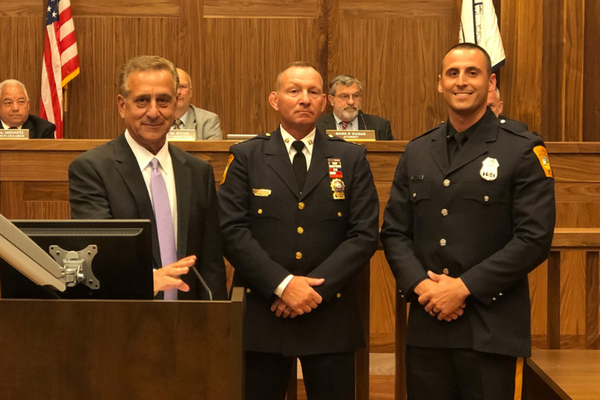A health insurance company has reversed a decision that denied life-changing gene therapy to a 10-year-old boy after his brother was approved treatment for the same genetic disorder.
Noah, 9, and Hunter, 10, both have Duchenne muscular dystrophy (DMD), which weakens the muscles, including the heart. Life expectancy ranges from 30 to 40 years old. Last November, Blue Cross Blue Shield approved a novel gene therapy for Noah, which has seen him thrive. A few months later, the company denied coverage to Hunter.
The Chicago-based family shared their story with The Independent last week on how they have watched Hunter suffer while his younger brother was able to learn to swim and play for longer. They also had lodged an appeal with the insurance company, and contacted local and state representatives to challenge the decision.
On Monday, the company told parents, Alison Joseph and William Small, that the decision had been reversed in a brief phone call.
“It’s just such a sense of relief after I got the phone call Monday. We're so grateful for all the outreach and coverage… it was a lot of efforts that [meant] we were able to get this done,” Alison told The Independent Wednesday.
Hunter’s application for the $3.2 million treatment had been denied in May after the company ruled it was “not medically necessary,” even though brother Noah appears to be thriving following the therapy, which he received in March.
Gene therapy will not cure the cruel disorder but could give the boys a greater chance of a better quality of life.
While Alison and William, both 44, have tried to shield Hunter from their fight to get him gene therapy, they were thrilled to tell their son that he will now receive the same treatment as his brother.
“When he got home from school on Monday, we told him, and he's excited,” said Alison. “He's obviously a little bit nervous…but he's excited.”
“Then on Tuesday morning before school, he said, ‘Mom, I just feel really happy.’ I asked him, why do you feel so happy? He's like, ‘because I can get gene therapy now,’” Alison said.

Blue Cross Blue Shield would not publicly discuss individual cases, citing privacy issues, when approached for comment by The Independent.
“We do want our members to know that medical experts, including doctors, are involved in reviews to ensure the treatments and services our members receive are evidence-based and not duplicative,” a spokesperson said. “Decisions are guided by nationwide best practices for care, helping to identify what has proven successful for members in the past.”
DMD causes muscle degeneration and weakness due to a mutation in the gene that produces dystrophin, a protein that protects muscle fibers from breaking down.
The disorder, which mostly affects boys, gets worse over time. It makes it difficult to walk, run, jump, and play, with children often delayed in reaching milestones like crawling, walking and talking. The boys will likely use wheelchairs from when they are teenagers.
Since Noah received the gene therapy Elevidys, manufactured by Sarepta Therapeutics, Alison said he has experienced “very obvious and noticeable improvements.”
“End of day fatigue and leg pain was something that he complained of frequently, and he has not complained of it once since getting gene therapy,” she said. “He learned how to swim this summer. His overall endurance is so much better.”
Noah was treated at Arkansas Children’s Hospital in Little Rock, where Hunter will hopefully undergo the same process, which involves a one-time infusion. The treatment isn’t a cure for DMD but helps improve muscle function and motor skills. So far, over 900 patients have had the treatment, the manufacturer says.

Elevidys is not without controversy and critics say there is limited evidence that the benefits of the treatment outweigh the risks. However, doctors are cautiously optimistic.
“All these newer gene transfer therapies are opening doors for these boys to possibly live longer and lead a good quality of life,” said Dr Aravindhan Veerapandiyan of Arkansas Children’s Hospital. “It’s changing the trajectory of the disease, changing the trajectory of their lives, improving the quality of life for the boys and their families.”
While Alison has the outcome she desired for her son, the toll of the fight to get Hunter’s coverage is only now dawning on the couple.
“I just felt so tired,” she said. “I feel like I've been running on adrenaline for weeks.So, we are very, very grateful that this is done.”
The family are especially grateful to the state representatives in Arkansas who supported their case, and Alison thanked Arkansas Sen. Tom Cotton for raising the matter with the Office of Personnel Management, which deals with federal health insurance programs.
The mom said that she encouraged other families facing difficulties with their health insurer for coverage to keep pushing.
She advised others to “make themselves aware” of the appeals process and to keep going if they face roadblocks.
“You don't have to take no for an answer,” Alison said. “Just don’t give up.”
What to know as Mississippi declares public health emergency over spike in infant deaths
Judge temporarily blocks US effort to remove dozens of immigrant Guatemalan and Honduran children
The nest is empty: Parents grapple with mixed emotions after children move out
Coroners in Northern Ireland ‘to be able to investigate some deaths abroad’







